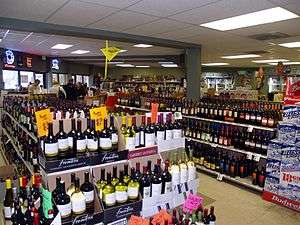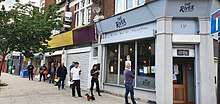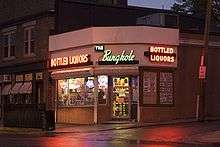Liquor store
A liquor store is a retail shop that predominantly sells prepackaged alcoholic beverages — typically in bottles — intended to be consumed off the store's premises. Depending on region and local idiom, they may also be called an off-licence (in the UK and Ireland), bottle store, bottle shop, package store (in much of the United States), party store (in Michigan),[1][2] ABC store, state store, or other similar terms. Many jurisdictions have an alcohol monopoly.

African countries
In South Africa, Namibia and Zimbabwe, these stores are generally called bottle stores.
United Kingdom and Ireland
In the United Kingdom and Ireland the corresponding term is off-licence, which refers to the fact that alcohol may be bought on the licensed premises, but must be consumed off the premises. Almost all supermarkets and groceries, and many petrol stations, have an off-licence.
In the United Kingdom, the "off-licence" status of a shop could once be used as a device to circumvent restrictive trading laws, particularly those concerning Sunday trading. Depending on local by-laws, shops might be either required to close at 12:00 once a week, or else not be allowed to trade in the evening. Shops with an off-licence made their hours similar to those of public houses, opening during lunch hours and from early evening to the mandatory closing time, usually 22:30 or 23:00. The Sunday Trading Act 1994, however, somewhat altered this situation.

During the COVID-19 pandemic in the United Kingdom, all pubs closed during the lockdown from 20 March 2020. However, on 25 March, off-licences were added to the list of essential businesses allowed to stay open, also enabling pubs and brewery taprooms with licences to sell beer for home consumption to offer takeaway sales and home deliveries.[3]
Oceania
- Australia – Regulation of alcoholic beverage sales is a state responsibility. Generally, beer, wine and spirits must be purchased at a bottle shop, colloquially known as a bottle-o. These may be a separate section of a supermarket or an individual shop – major retail corporations usually have their own bottle shop franchises located close to their supermarket operations. Drinking establishments may also sell liquor for off-site consumption. Drive-through alcoholic retail outlets are common. The state of Victoria and the Australian Capital Territory permit the sale of alcoholic beverages from supermarkets and convenience shops.
- New Zealand – Supermarkets may sell beer, cider and wine with no more than 15% ABV only. Spirits (whisky, brandy, rum, gin, vodka, etc.), including ready to drink (RTD) mixed spirits, must be purchased at bottle shops. Off-licence is also used for beverage outlets inside sporting venues, whereby alcoholic beverages are bought "outside" the point-of-sale, even if it was inside a food outlet, because it can be consumed at the stands, but is still consumed within the vicinity of the venue itself, and cannot be taken out of the venue.
Nordic countries
- Denmark – Alcoholic beverages can be bought at any grocery store or kiosk. There are several dedicated stores specialised in certain types of alcohol, typical wine or beer.
- Faroe Islands – Alcoholic beverages above 1.8% ABV can be bought in Rúsdrekkasøla Landsins, also known as Rúsan
- Finland – As of 2018, grocery stores may sell beer and other alcoholic beverages, including alcopops made with distilled alcohol, no higher than 5.5% alcohol by volume (ABV).[4] (Until 2018, the limit was 4.7% ABV, and grocery stores were allowed to only sell drinks produced by fermentation.) All other alcohol must be purchased in the Alko store.
- Iceland – Can only be bought at hard-liquor stores. Vínbúð stores.
- Norway – Alcoholic beverages above 4.8% ABV can only be bought at Vinmonopolet stores.
- Sweden – Grocery stores may sell beer no higher than 3.5% ABV. All other alcohol must be purchased in the state-run Systembolaget stores.
European Union
In Bulgaria, Croatia, Cyprus, Czech Republic, Estonia, France, Germany, Greece, Hungary, Italy, Latvia, Lithuania, Luxembourg, Malta, Netherlands, Poland, Portugal, Romania, Slovakia, Slovenia and Spain all supermarkets, convenience stores, and gas stations may sell beer, wine, and liquors only if they possess a licence. The consumption of alcohol on premises is not forbidden, but is frowned upon. In the Netherlands supermarkets are allowed to sell alcoholic beverages up to 15% ABV, hard liquor is only sold from specialized bottle shops.
United States

The Twenty-first Amendment of the United States Constitution allows states to regulate the sale and consumption of alcoholic beverages.[5] State regulations vary widely. The majority of the U.S. states have laws specifying which alcoholic beverages must be sold in specialty liquor stores and which may be sold in other venues.
In seventeen alcoholic beverage control (ABC) states, the specialty liquor stores are owned and operated exclusively by the state government, where liquor stores often sell only spirits or sometimes sell spirits and wine but not beer. ABC-run stores may be called ABC stores or state stores.
In Alabama, Connecticut,[6] Georgia, Louisiana, Massachusetts, Rhode Island, and Texas,[6] liquor stores are also known as package stores; locally in Connecticut, Massachusetts, and areas bordering these states the term pack or packie is used as well, because purchased liquor must be packaged in sealed bottles or other containers when it is taken from the store.[7]
In four states (Colorado, Kansas, Minnesota, and Utah), only low-point beer may be sold in supermarkets or gas stations. In Utah, stores not owned and operated by the state are known as Package Agencies. These are liquor outlets operated by private individuals or corporate entities under contract with the state for the purpose of selling packaged liquor, wine and beer to the general public for off-premise consumption. Package Agencies are located in communities too small to warrant the establishment of a state store, and in resorts and hotels where the outlets exist primarily for the benefit of their guests. In Minnesota there are both private liquor stores or city-owned municipal liquor stores.[8] They are sometimes known as "Off Sales", meaning purchase for off-premises consumption, similar to "Off-licence" in the UK. A bar or tavern is an "On Sale" where liquor is consumed on-premises. Municipal liquor stores are sometimes called "Munis."[8]
In some states (e.g., California, Louisiana, Missouri, Nevada, New Mexico, and Wisconsin), all alcoholic beverages can be sold practically anywhere, including drug stores and gas stations.
In Washington state, all beer and wine are available in specialty stores, grocery stores, convenience stores, department stores, taverns, and other locations. All spirits are available in stores greater than 10,000 sq ft (such as grocery stores, big box liquor chains, and drug stores). There are two exceptions to the 10,000 sq ft rule: 1) former state and contract liquor stores that reopened under private ownership may also sell spirits provided they have been issued a new license from the state; and 2) cities, mostly in rural areas, that do not have a store that meets the minimum floor space may be allowed to sell spirits if the Liquor Control Board deems that there are no sufficient establishments within the trade area.
In Los Angeles and most parts of Southern California, Angelenos often colloquially refer "liquor store" to any convenience store, corner store, minimart, or similar small local neighborhood grocery store.
In 2012, Drizly, an alcohol e-commerce platform, launched its service in Boston allowing liquor stores to offer on-demand delivery. Other alcohol e-commerce platforms include Minibar, Saucey, and Bevz. In 2020, Instacart announced that users would be able to add alcohol to their pick-up orders.[9]
Canada
All provinces except Alberta have government-owned retail liquor monopolies. Alberta has only privately owned liquor stores. British Columbia and Saskatchewan have both private and government-owned retail liquor outlets.
Due to federal law, all provincial liquor boards must act as the first importer of alcoholic beverages.[10][11]
- Alberta – Only liquor stores may sell alcoholic beverages in urban areas, but unlike other provinces they are all privately owned and operated. Recently the province has allowed supermarkets to open attached liquor stores, but with separate entrances. Urban gasoline (petrol) stations and convenience stores may also have attached liquor stores but with separate entrances and ownership. In areas without another liquor retailer within a 15 km radius, any licensed retailer may sell beer, wine, and liquor, including convenience stores, general stores, and gasoline (petrol) stations. The AGLC has retained its monopoly over the wholesaling of imported beer, wine and distilled spirits, although the distribution of these products is done by a private contractor.
- British Columbia – Alcoholic beverages may be sold only:
- in privately owned retail stores (stores can only be operated by primary liquor license holders, such as bars, pubs and hotels, but the stores can be located off site)
- in government-owned stores,
- in rural government-appointed liquor agencies (which may be a gas station or convenience store).
- There are also VQA (Vintners Quality Alliance) wine stores, which are privately owned. These stores only sell only British Columbia wines that have the VQA designation; these wines are sold at the same price as in the government liquor stores. There are also a limited number of private wine shops, which can sell both British Columbia and non-British Columbia wines.
- In 2012 British Columbia announced it planned to fully privatize liquor wholesale distribution by 2015. In September 2012 the initiative to privatize liquor wholesale distribution was cancelled, a term agreed upon during contract negotiations with the BCGEU.
- Manitoba – Only hotels may sell chilled domestic beer. Beer, Wine, and Liquor only sold by government owned Liquor Marts. There are also a limited number of private wine retailers in Manitoba as well.
- New Brunswick – Only government owned liquor stores or rural government appointed liquor agencies may sell beer, wine, and liquor. However, breweries and cottage wineries may sell directly to the public if licensed to do so.
- Newfoundland and Labrador – Convenience Stores may sell beer that is brewed locally. Wine, liquor and imported beer is only sold by government owned liquor stores, or rural government appointed liquor agencies.
- Nova Scotia – In the past, only the provincially owned NSLC (Nova Scotia Liquor Corporation) could sell liquor products, including hard liquor, wine, and beer. Many NSLC locations are connected to grocery stores. Over the past five years, the NSLC began to allow a limited number of small private agency stores to operate in rural areas where there is not a NSLC location.
- Ontario – Brewers Retail Inc. (operating as The Beer Store), originally owned by a co-operative of Ontario brewers but now owned by multinational brewers mostly based outside Canada, is the only privately owned entity that can sell beer. Only the provincially owned Liquor Control Board of Ontario (LCBO) may sell hard liquor or wine, though it also sells beer, particularly in small markets that Brewers Retail does not serve. There are also a limited number of privately owned specialty wine stores: Wine Rack, run by Vincor International and The Wine Shop (formerly Vineyards Estate Wines), run by Andres Wines. The province allows Ontario wineries to maintain a fixed number of off-site retail locations under a clause that was grandfathered into legislation when the Canada-US free-trade agreement came into effect in 1989, and further allowed by WTO regulations implemented in 1995. Ontario is the only province where a winery is able to form a partnership with a department store to operate such retail locations.[12][13]
- Prince Edward Island – Only government owned liquor stores may sell beer, wine, and liquor.
- Québec – Only the provincially owned Société des alcools du Québec (SAQ) may sell hard liquor. Wine (that is bottled in Québec or distributed through a Québec representative) and beer (that is brewed in Québec or imported beer that is distributed by a local brewer) can be purchased at dépanneurs (corner stores) and supermarkets.
- Saskatchewan – Until the 2010s, only hotels, government-owned stores, and rural private/government liquor stores (i.e., private contractors) could sell beer, wine, and liquor. However, since then, the provincial Saskatchewan Liquor Board has licensed private stores in urban areas.
See also
References
- Cassidy, Frederic Gomes, and Joan Houston Hall (eds.) (2002). Dictionary of American Regional English. Cambridge, Massachusetts: Harvard University Press.
- Gordon, Heather (2004). Newcomer's Handbook For Moving To And Living In Boston: Including Cambridge, Brookline, And Somerville. First Books. pp. 14. ISBN 978-0912301549.
- Davies, Rob; Sweney, Mark (25 March 2020). "UK pubs and breweries push to be allowed takeaway sales". Guardian. Retrieved 11 April 2020.
- https://yle.fi/uutiset/osasto/news/stronger_beer_in_shops_next_week/9997261
- U.S. Constitution, Amendment XXI, Section 2.
- "CT Package Stores".
- E.g., Connecticut General Statutes, Chap. 545, Section 30-20.
- History of the Muni City of Wayzata, MN
- "Instacart Upgrades its Pick up Service with New Features Adds Alcohol Pick up Option"
- Canadian Importation of Intoxicating Liquors Act
- The distribution arrangements for Canadian alcohol sales are summarized in Statistics Canada's "The Control and Sale of Alcoholic Beverages in Canada," page 46.
- Details on the Vincor and Wal-Mart retail locations
- Full details about Ontario's retail alcohol system can be found in the most current LCBO Annual Report. "Archived copy". Archived from the original on 2006-10-22. Retrieved 2006-09-22.CS1 maint: archived copy as title (link)